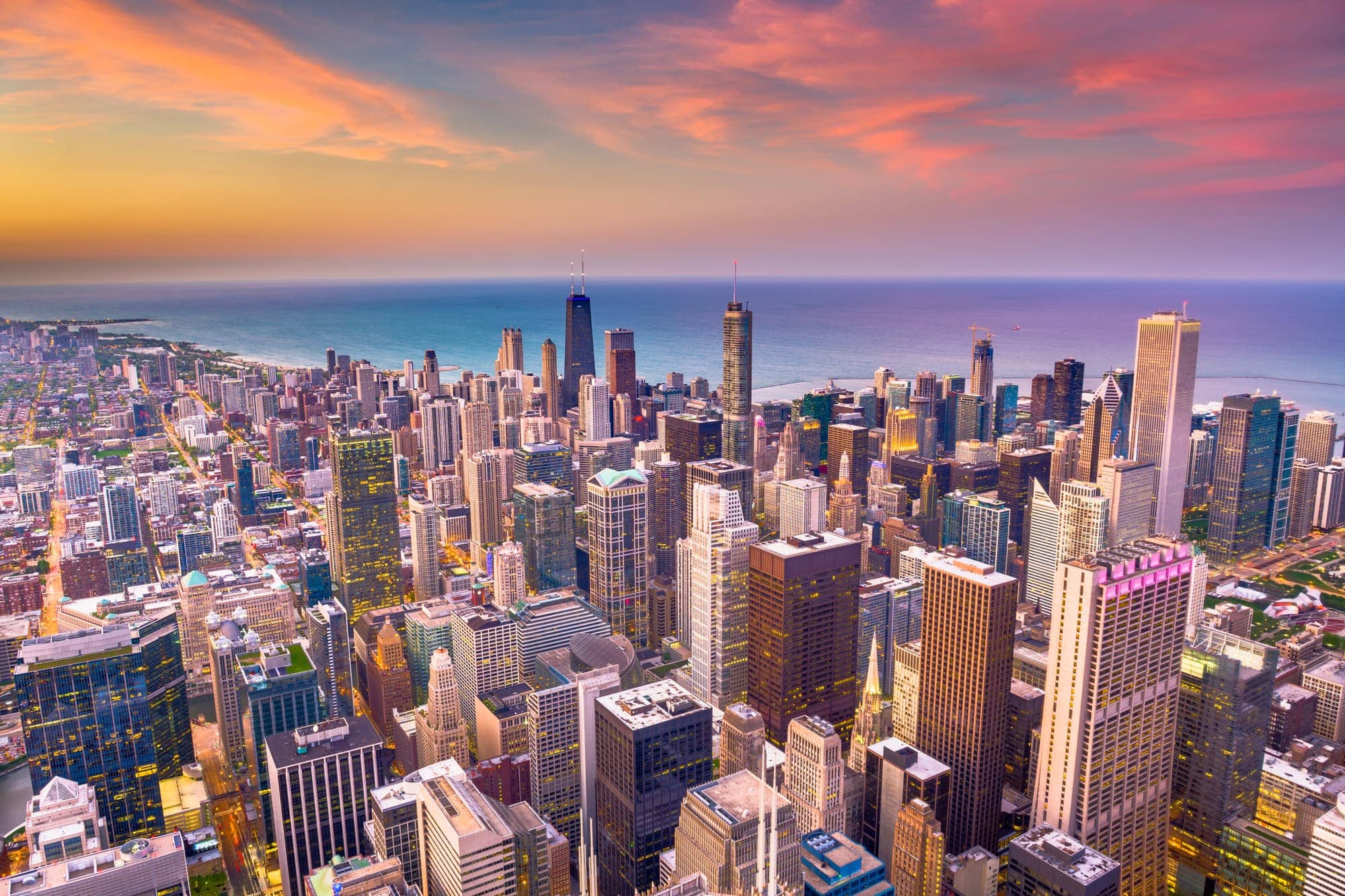Moving to Chicago is an exciting decision that can open up many opportunities for you. Whether you are looking for vibrant city life, a diverse cultural scene, or a thriving job market, Chicago has something for everyone.
But before you pack your bags and hit the road, you need to plan ahead and do some research. That’s why we created this ultimate guide to moving to Chicago, where we will cover everything you need to know about the Windy City.
As the third largest city in the US, Chicago offers a lot of value for its residents who are looking for a new city to call home. From finding the best neighborhoods and schools to navigating the public transportation and weather to enjoying the local attractions and cuisine, we will help you make the most of your move.
We will also show you how to find your dream home in Chicago with the help of a professional real estate agent. Keep reading to find out more.
Moving to Chicago
As you consider moving to Chicago, you may be drawn to the city’s rich history, world-class architecture, lively arts scene, and excellent job opportunities. Known for its friendly locals, diverse food options, and iconic attractions like the Magnificent Mile, Chicago offers a unique blend of Midwestern charm and urban sophistication.
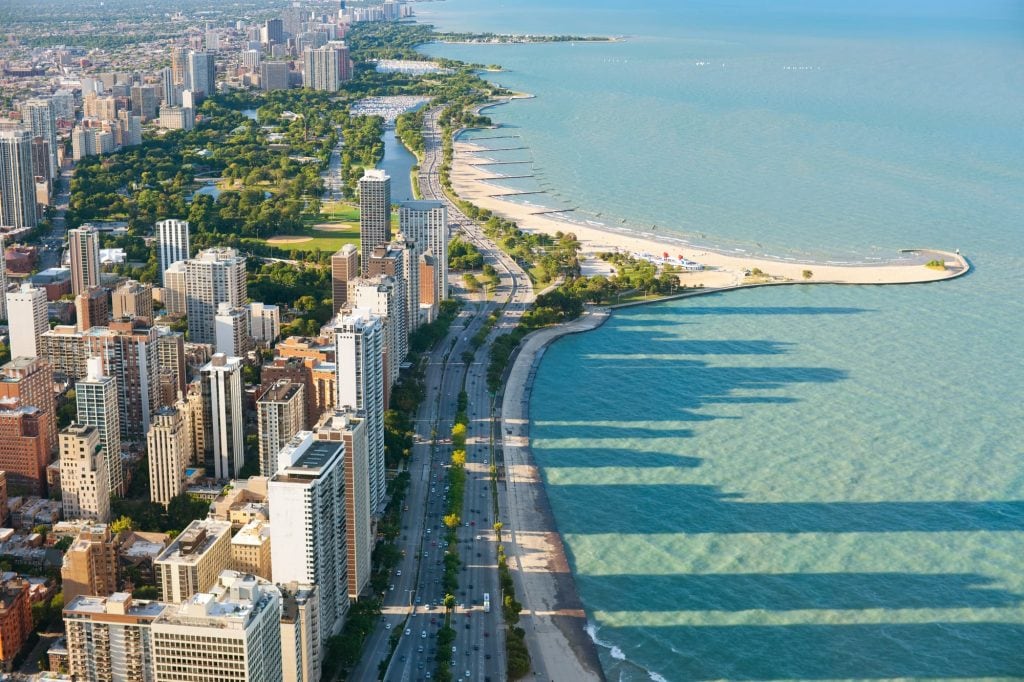
In this guide, we will delve into the cost of living, housing, and day-to-day expenses to help you make an informed decision about your move. You will also learn about some of the perks of living in Chicago, such as enjoying the stunning views of Lake Michigan, visiting the renowned Art Institute, sampling the famous deep dish pizza and Chicago style hot dog, and exploring the vibrant neighborhoods along the Chicago River.
Whether you are moving to Chicago from another major city or a smaller town, you will find that the Windy City has something for everyone. As the third most populous city in the US and a hub for transportation, commerce, and culture, Chicago is a great place to start a new chapter in your life.
Cost of Living in Chicago
Before moving to Chicago real estate, you should know about the financial needs for daily living. So, let’s dive into the factors that contribute to the cost of living in Chicago, including day-to-day expenses and housing.
Day-to-Day Expenses
When living in Chicago, day-to-day expenses such as utilities, food, and gas are generally reasonable compared to other major cities within Illinois. Utilities are typically lower than the national average, thanks to the city’s use of hydroelectric power from the Chicago River.
Food prices vary depending on where you shop and dine, but you can find affordable and diverse options in neighborhoods like River North, which was rebuilt after the Great Chicago Fire of 1871. Gas prices are usually on par with or slightly higher than the national average, although public transportation options can help offset this expense.
Chicago’s public transportation system is one of the best in the country, with buses, trains, and bike lanes that connect you to different parts of the city. You can also enjoy free or low-cost attractions such as the Garfield Park Conservatory, one of the largest botanical gardens in the US.
Housing
The Chicago real estate market offers a range of options for both renters and buyers. While average house prices and rent can be higher in more desirable neighborhoods, there are still affordable Chicago homes for sale available throughout the city.
Aside from single-family homes, the real estate market in Chicago comprises multi-family homes, townhouses, and condos for sale. Housing in the city sells at a median price of $285K, generally more accessible than in other major cities like New York or San Francisco, making it an attractive choice for those looking for a more budget-friendly urban lifestyle.
To explore available properties and learn more about real estate available in Chicago, you can contact a local eXp real estate agent. They have extensive knowledge and experience in the Chicago area and can help you find the best neighborhood and school options for your needs, whether you are looking for Chicago private schools or public ones.
Taxes
When moving to Chicago, it’s essential to factor in taxes as part of your overall cost of living. Illinois has a flat income tax rate of 4.95%, and the city of Chicago levies additional sales taxes, which can be as high as 10.25% on retail purchases.
Property taxes in Chicago are also on the higher side compared to other cities, although this can vary depending on the neighborhood and specific property. Keep these taxes in mind as you budget for your move and plan your finances accordingly.
As a Chicago resident, you may also be eligible for some tax credits and exemptions that can lower your tax burden. For example, you may qualify for the Earned Income Tax Credit (EITC), the Property Tax Credit, or the Senior Citizens Assessment Freeze Homestead Exemption. You can consult with a tax professional or visit the Illinois Department of Revenue website for more information on these and other tax benefits.
Weather in Chicago
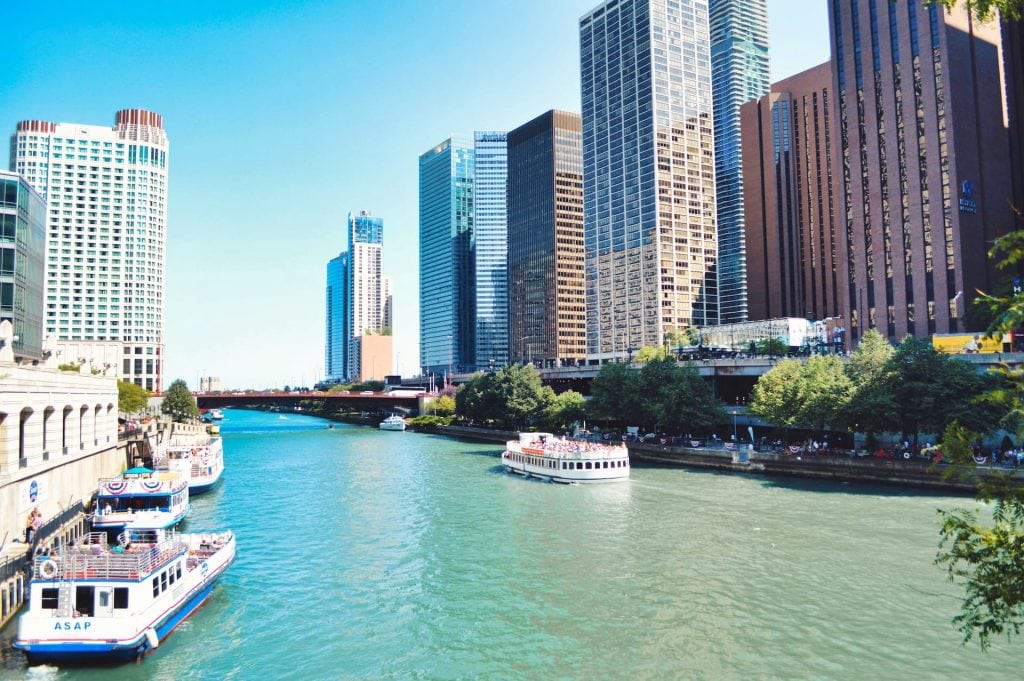
If you are moving to Chicago, you should be prepared for a wide range of weather conditions throughout the year, with hot summers and cold, snowy winters. The city’s location along Lake Michigan can lead to unpredictable and sometimes extreme weather, such as lake-effect snowstorms and windy conditions.
The city’s outdoor attractions are best enjoyed in spring and fall when the weather is mild and pleasant. Summer temperatures can reach the mid-80s Fahrenheit, while winter temperatures can fall to the teens or lower.
The Best Chicago Neighborhoods
Let’s explore some of the best neighborhoods Chicago has to offer, focusing on demographics, amenities, and lifestyles.
Lincoln Park
Population: 64,000
Median Income: $99,000
Median Home Price: $530K
If you are moving to Chicago and looking for a vibrant neighborhood with a lot of amenities, Lincoln Park might be the perfect fit for you. The community is known for its tree-lined streets, historic brownstones, and lively entertainment scene.
In addition, the area offers an excellent mix of amenities, including top-rated schools, DePaul University, world-class shopping, and dining options. Lincoln Park also boasts ample green space with the sprawling Lincoln Park, which features the Lincoln Park Zoo, conservatory, and several museums.
Ideal for families, young professionals, and students, Lincoln Park offers a strong sense of community and a diverse range of housing options, from high-end condos to charming single-family homes for sale in Chicago.
Its location along the lakefront provides easy access to public transportation, making it a convenient choice for those working in Chicago’s city center. With its blend of urban amenities and residential charm, Lincoln Park is a highly desirable place to call home.
Lakeview
Population: 98,000
Median Income: $88,000
Median Home Price: $450K
For those moving to Chicago and looking for a lively and diverse neighborhood with a lot of amenities, Lakeview might be a good option to purchase homes in Windy City. Located on Chicago’s North Side, Lakeview is known for its bustling commercial districts, beautiful parks, and vibrant nightlife.
The area offers a mix of amenities, including excellent schools, shops, restaurants, and cultural institutions like the Music Box Theatre. Lakeview is also home to Wrigley Field, where the Chicago Cubs play, making it a popular destination for sports enthusiasts.
The neighborhood is ideal for young professionals, families, and retirees alike, with a variety of housing options ranging from modern condos to historic greystones. With its proximity to the lakefront and multiple public transportation options, Lakeview provides a convenient and enjoyable urban lifestyle.
Near North Side
Population: 85,000
Median Income: $97,000
Median Home Price: $475K
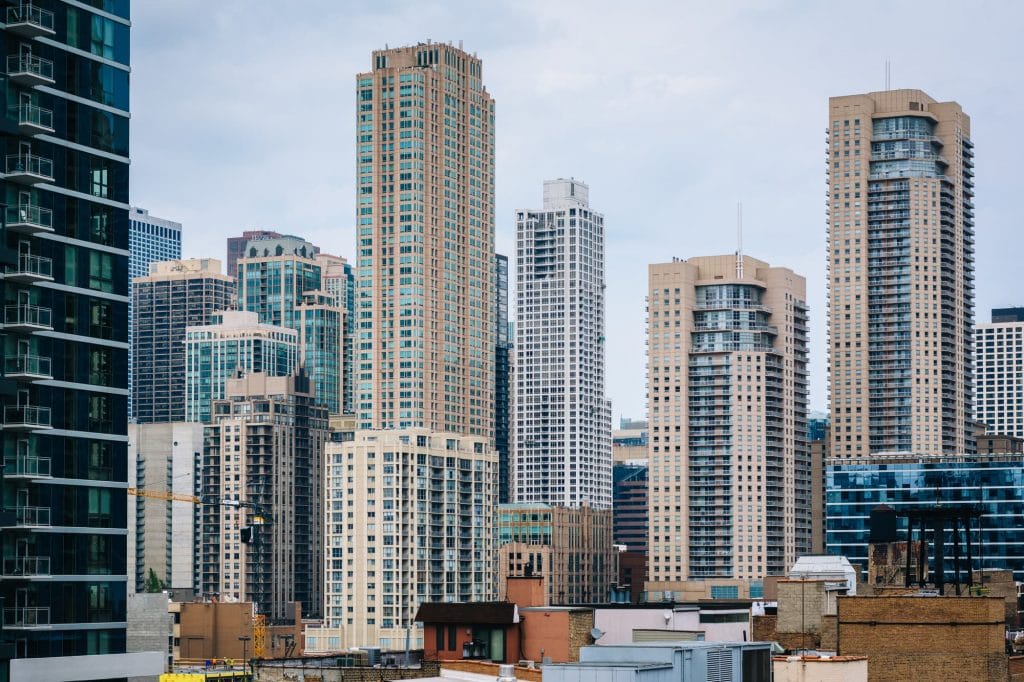
If you are moving to Chicago and looking for an upscale, bustling neighborhood with easy access to downtown Chicago, the Near North Side might be a great choice for you.
Known for its luxury high-rises, renowned shopping district (the Magnificent Mile), and world-class dining, the area offers a wealth of amenities and attractions. The Near North Side is home to several cultural institutions, such as the Museum of Contemporary Art, and features beautiful parks like the Chicago Riverwalk.
This neighborhood is well-suited for professionals, retirees, and families seeking a sophisticated urban lifestyle with easy access to the city center. Housing options include high-end condos, townhouses, and historic mansions, catering to a wide range of tastes and budgets.
West Loop
Population: 35,000
Median Income: $100,000
Median Home Price: $525K
The West Loop, a former industrial district, has transformed into one of Chicago’s trendiest neighborhoods, known for its converted loft spaces, innovative dining scene, and thriving art community.
The area offers a mix of amenities, such as boutique shops, galleries, and top-rated schools, making it an attractive choice for families and young professionals moving to Chicago. Housing options in the West Loop include industrial lofts, modern Chicago condos for sale, and single-family homes.
The neighborhood’s proximity to the city center and convenient public transportation options make it an excellent choice for those seeking a dynamic urban environment with a strong sense of community.
Wicker Park
Population: 53,000
Median Income: $81,574
Median Home Price: $540K
Located on the northwest side of Chicago, Wicker Park is a neighborhood that boasts a rich artistic culture, historic architecture, and a diverse mix of residents. The area has a variety of amenities, such as trendy restaurants, boutique shops, and art galleries that appeal to the diverse community.
Top-rated schools and access to several hospitals, including Presence Saints Mary and Elizabeth Medical Center, make Wicker Park an attractive location for families moving to Chicago.
The neighborhood’s close proximity to Chicago city center and public transportation options make it ideal for professionals and young adults who appreciate the urban atmosphere.
Job Market in Chicago
The city has a diverse and robust economy, with major employers spanning various industries. Finance, technology, healthcare, and education are some of the most significant sectors in the city. The city serves as a global financial hub, with the Chicago Mercantile Exchange, the Chicago Board Options Exchange, and the Federal Reserve Bank of Chicago located here.
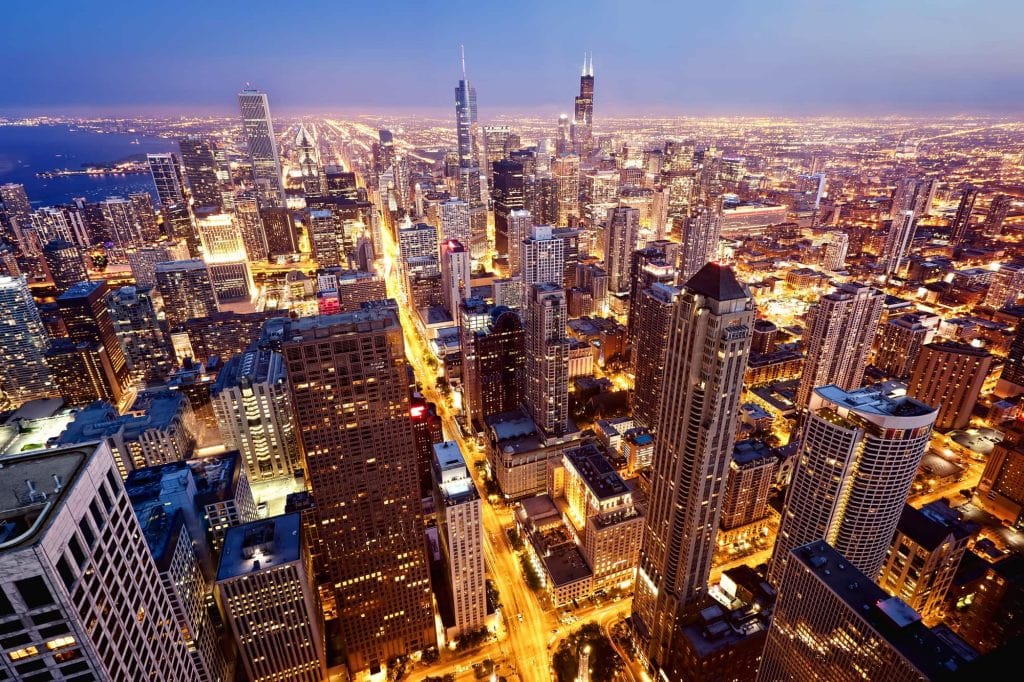
Major tech companies, such as Google, Salesforce, and Facebook, have a presence in the city, providing ample job opportunities in the tech sector. The healthcare industry is also thriving, with Northwestern Memorial Hospital, Rush University Medical Center, and the University of Chicago Medical Center among the top employers in the region.
Additionally, the city is home to prestigious educational institutions like the University of Chicago, Northwestern University, and the Illinois Institute of Technology, creating well-paying jobs in academia and research. If you are looking for a diverse and robust economy when moving to Chicago, you will be pleased to know that the city has plenty of options for you.
What To Do in Chicago
When moving to Chicago, you can experience the best of the Windy City with its lively nightlife and entertainment, annual festivals and events, diverse parks and recreational offerings, and culturally rich attractions.
Nightlife and Entertainment
Chicago’s nightlife and entertainment scene is one of the most vibrant in the country. The city is famous for its blues and jazz clubs, such as Kingston Mines and Green Mill. Foodies moving to Chicago can indulge in various culinary options, from Michelin-starred restaurants to classic deep-dish pizza joints. For those looking for a night on the town, there is no shortage of bars, clubs, and breweries throughout the city, catering to various tastes and preferences.
Festivals and Events
Chicago hosts numerous annual events and festivals that draw millions of visitors worldwide. Some of the most popular events include Lollapalooza, a four-day music festival showcasing top artists, the Taste of Chicago, a massive outdoor food festival, and the Chicago Air and Water Show.
The city also celebrates its diverse culture with neighborhood festivals such as the Chicago Pride Parade, the Chinese New Year Parade, and the Mexican Independence Day Parade.
Parks and Recreation
The city offers a variety of parks, beaches, and recreational opportunities for Chicago residents and visitors alike. The expansive Grant Park, often called “Chicago’s front yard,” is home to iconic landmarks such as Buckingham Fountain and Millennium Park, which feature the famous “Bean” sculpture.
The lakefront features 26 miles of shoreline, including numerous beaches like North Avenue Beach and Oak Street Beach. The 18-mile-long Lakefront Trail offers a scenic route for walking, running, and biking, while the Chicago Riverwalk presents a unique urban experience along the river’s edge.
Cultural and Sporting Attractions
Chicago boasts a rich cultural scene with world-class museums, theaters, and art galleries. The Art Institute of Chicago, the Field Museum, and the Museum of Science and Industry are among the city’s most famous institutions.
If you’re a theater enthusiast moving to Chicago, you can catch a show at the renowned Steppenwolf Theatre, the Goodman Theatre, or the Chicago Theatre. While sports fans can cheer on their favorite teams, as Chicago is home to several professional sports franchises.
Education in Chicago
If you are moving to Chicago and looking for quality education, you will be happy to explore the wide range of educational opportunities in the city, from top-rated schools to renowned colleges and universities.
Schools
Chicago offers a diverse range of public and private K-12 schools, providing quality education for its residents. Chicago Public Schools (CPS) is the third-largest school district in the United States, serving approximately 340,000 students across 600+ schools.
Some of the top-rated public schools in the city include Walter Payton College Prep, Northside College Preparatory High School, and Jones College Prep, all of which are recognized for their academic excellence and consistently rank among the best schools in the state and nationally.
Additionally, Chicago is home to several prestigious private schools, such as the Latin School of Chicago, the University of Chicago Laboratory Schools, and Francis W. Parker School.
Colleges and Universities
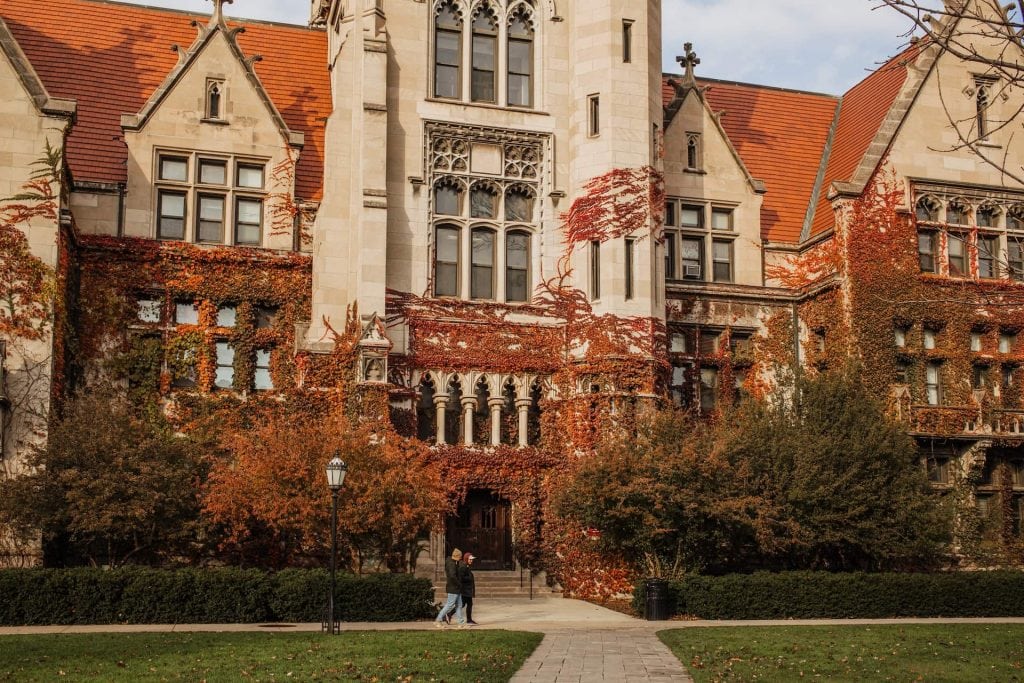
Moving to Chicago is ideal for those seeking higher education, as it boasts several world-class colleges and universities. The University of Chicago, a private research university, ranks among the top institutions in the world and is known for its rigorous academics and distinguished faculty, including numerous Nobel laureates.
Northwestern University, located in nearby Evanston, is another highly regarded institution offering top-ranked programs in various fields such as business, journalism, and engineering.
The Illinois Institute of Technology, Columbia College Chicago, DePaul University, and Loyola University Chicago are notable institutions providing quality education and contributing to the city’s vibrant academic landscape.
Crime in Chicago
Before moving to Chicago, it’s essential to consider safety as a key factor. Let’s examine crime rates in Chicago, focusing on violent and property crimes.
Violent Crime
While Chicago has gained a reputation for its crime rates, it’s crucial to recognize that crime is not evenly distributed throughout the city. Some areas experience higher rates of violent crime than others.
According to the Chicago Police Department, violent crime rates have generally decreased in recent years. However, it is still essential to research specific neighborhoods and take appropriate safety precautions when choosing a place to live.
Property Crime
Property crimes, such as theft, burglary, and vandalism, are more common in Chicago than violent crimes. In 2020, the FBI reported 64,743 property crimes in the city, which is a decrease compared to previous years.
As with violent crime, property crime rates can vary significantly between neighborhoods. It is important to research specific areas, take necessary precautions to protect your property, and consider factors like access to public transportation and proximity to local amenities when choosing your new home.
Getting Around Chicago
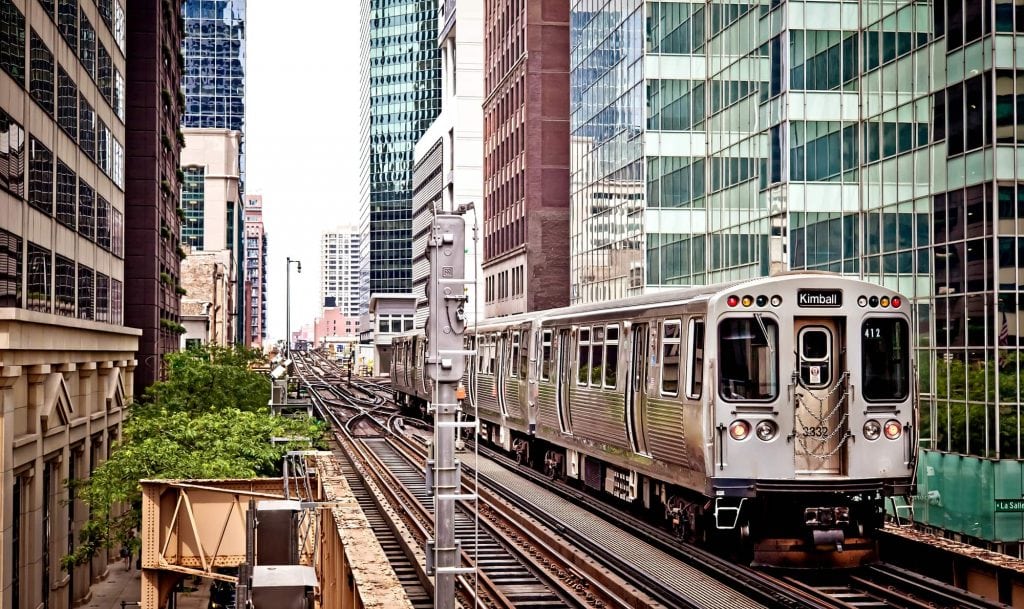
Chicago boasts an extensive public transportation system that makes it easy for residents and visitors to navigate the city without a car. The Chicago Transit Authority (CTA) operates a bus service and the famous “L” train system, which consists of eight different rail lines covering a vast network with train stations throughout the city. The CTA’s services connect neighborhoods, downtown areas, and key attractions, making travel convenient and cost-effective.
In addition to the city’s public transportation system, Chicago offers a variety of alternative transportation options, such as bike-sharing programs like Divvy and a network of protected bike lanes throughout the city. Taxis and rideshare services like Uber and Lyft are also readily available for those who prefer a more personalized mode of transportation.
If you’re moving to Chicago without a vehicle, it’s not a big issue. Chicago is among the most walkable cities in the country with a walk score of 77 out of 100. As a result, owning a car in Chicago is unnecessary for most residents, especially if they live and work in areas well-served by public transportation.
However, having a car can be helpful for those living in neighborhoods with limited transit options or those who frequently travel outside the city. Remember that owning a car in Chicago comes with additional costs, such as parking, insurance, and maintenance, which should be factored into your overall cost of living.
Frequently Asked Questions: Moving to Chicago
Explore the ins and outs of moving to Chicago with our FAQ guide covering affordability, transportation, and more.
Is Chicago worth moving to?
Moving to Chicago is definitely worth it, as it offers a vibrant culture, diverse neighborhoods, job opportunities, and affordable housing costs compared to other major cities.
What is a good salary to live in Chicago?
A good salary in Chicago is around $60,000 to $75,000 per year, depending on your lifestyle and expenses.
Why is Chicago housing so cheap?
Chicago’s housing costs are relatively affordable due to a surplus of available properties, economic factors, and lower demand than coastal cities.
What do you need to know before you live in Chicago?
When moving to Windy City, be prepared for extreme weather, high taxes, diverse neighborhoods, and various public transportation options.
What are the pros and cons of living in Chicago?
The pros and cons of moving to Chicago are:
- Pros: affordability, cultural attractions, job opportunities, and food scene.
- Cons: harsh winters, crime rates, and high taxes.
Is Chicago livable without a car?
Yes, Chicago offers extensive public transportation options, including buses, trains, and bike-sharing programs.
Which Chicago neighborhoods are the most affordable?
Albany Park, Rogers Park, Bridgeport, and Hyde Park are the best neighborhoods if you’re moving to Chicago and looking for affordable housing prices.
Is Chicago pet-friendly?
Yes, Chicago is pet-friendly, with numerous dog parks, pet-friendly restaurants, and services catering to pet owners.
Final Thoughts
In conclusion, Chicago is a vibrant city with a rich culture and a thriving job market that offers affordable living options compared to other major cities. It’s an excellent choice for those moving to Chicago to enjoy big-city life without the high cost of living typically associated with coastal cities.
Remember to consider the pros and cons, transportation options, and diverse neighborhoods when deciding whether to make a move. Ready to make the move to Chicago? You can sign up for listing alerts so you never miss a chance at your new dream home!
To begin your journey, reach out to a local eXp real estate agent and embark on this exciting process today. Seasoned real estate agents possess the expertise to ensure you secure the most advantageous deal when transitioning to this dynamic and lively city.
